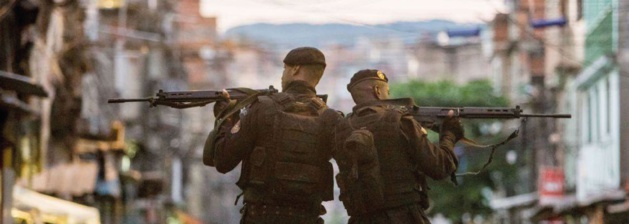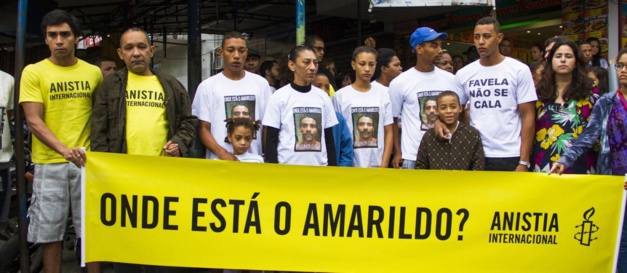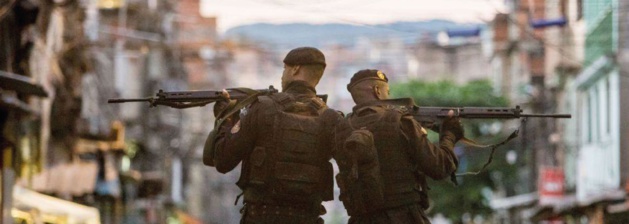
Battalion of special “BOPE” police forces on patrol in a favela in Rio de Janeiro - Credit RR
Brazil has long been known for its insecurity, but the 2014 track record is even more alarming: increase in homicides, numerous deaths during police operations, violently repressed demonstrations, attacks on journalists, deadly rebellions in jail and torture.
2014: a deadly year
For Atila Roque, “it is obvious that a country where 60,000 people die each year cannot bring an appropriate answer to the fundamental principle of the State, protecting the population”. According to the organisation’s report, militarization of police forces contributes to Brazil’s considerably deadly violence. In the last five years, the Brazilian police have killed as many people as the American police have in 30 years, although the latter are among the most murderous of developed countries.
Certain cases left a mark on 2014. Among these, the murder of Pedreiro Amarildo in the Rocinha favela in Rio de Janeiro tortured to death by a brigade of the “pacificatory police” and the famous dancer Douglas da Silva who died from his injuries after he was shot during a police operation in the Cantagalo favela. Last November, in Belèm in the north of the country, a massacre directed by agents of the military police, in revenge of the murder of one of their colleagues, led to a dozen deaths. The assessment is unanimous: in Brazil, especially in Rio de Janeiro and Sao Paulo, safety is extremely fragile and public authorities are not able to have proper control over their own organisation. They are seriously lacking in transparency and accounts on the behaviour of their own agents. Obviously, policemen are not the only responsible people for the high mortality rate in Brazil. Rather, they are sometimes victims of it. However, they cannot manage to neutralize the other actors. Insufficient and inadequate training, lack of equipment and low wages are some of the explanations of this phenomenon.
An impunity that encourages violence
Amnesty International points out another cause for this alarming scenario: the immense impunity of the agents of the police forces who commit violations of Human Rights. Justice faces huge difficulties in investigating homicides. On average, 85% remain unpunished, either because of the inability of police forces to find the culprits or because of a lack of investigation. “There is almost a licence to kill in Brazil. A crime is investigated only if it was committed in public and witnessed. The crime of which everybody saw the culprit” says Atila Roque. The omnipresence of violence among civilians as well as the people supposed to protect them generates a constant anxiety and feeling of fear among the population. Brazilians see their lives paralyzed with daily fear of danger.

A poor prison system
The Brazilian prison population is the fourth greatest worldwide. However, massive incarceration does not mean efficient incarceration. In Brazil, the people in prison are not the ones who commit the more violent crimes. They are property, holdings criminals or people involved in drug trafficking. According to the Amnesty International report, extreme overpopulation, degrading living conditions, torture and violence remain endemic issues in Brazilian prisons. For instance, the prison located in Pedrinhas, in the state of Maranhão was the scene of 78 murders of prisoners between October 2013 and October 2014. The situation is such that during the last years, many complaints regarding incarceration conditions were filed with the Inter-American Court and Commission of Human Rights.
Recommendations of Amnesty International
The entity suggests the elaboration of a national goal plan regarding an immediate decrease in homicides as well as demilitarization and reform of police forces. This would be achieved through external mechanisms of control of their activities, valorization of agents as well as an improvement of their training, working conditions and means of investigation. Amnesty International also demands the introduction of a protection plan for Human Rights defenders. “It is necessary that we consider a reform and restructuration of the police. We must think about safety not as an integral part of public politics but as a field of affirmation of Human Rights, and therefore as a national problem” insisted Atila Roque.





























